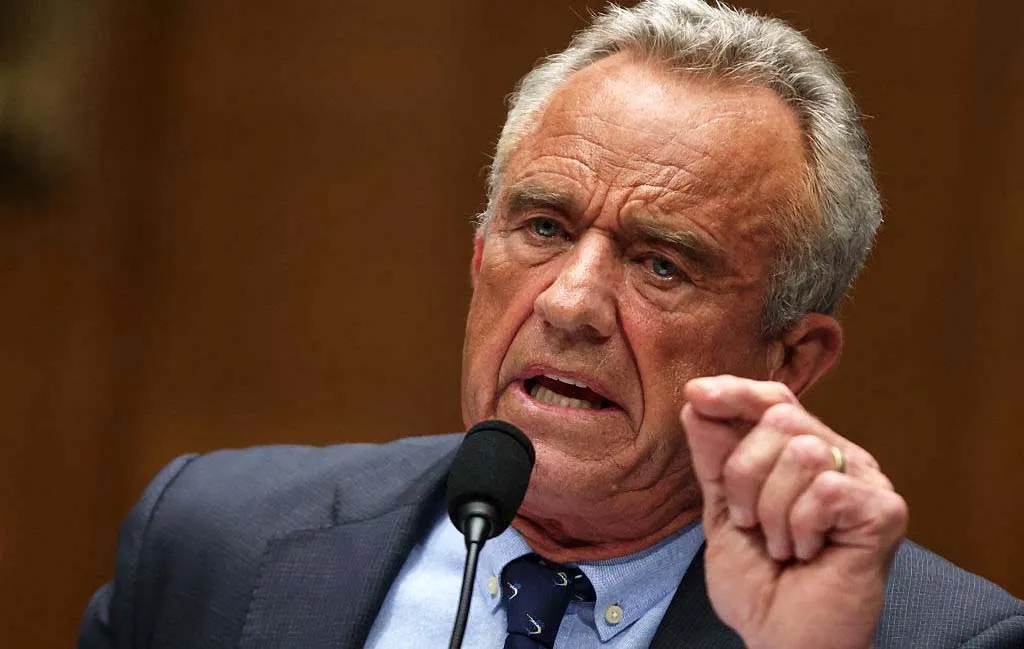
Robert F. Kennedy Jr.
Photo: Samuel Corum/Getty Images
Provider groups are suing Robert F. Kennedy Jr. both individually and in his capacity as secretary of the Department of Health and Human Services over his directive to remove the COVID-19 vaccine from the Centers for Disease Control and Prevention's recommended immunization schedules.
The directive, unless vacated, will result in preventable deaths, including the unborn and newborns under six months old, the lawsuit said.
"Unless the secretary's baseless and uninformed policy decision is vacated, pregnant women, their unborn children, and, in fact, all children remain at grave and immediate risk of contracting a preventable disease," the lawsuit said. "This decision immediately exposes these vulnerable populations to a serious illness with potentially irreversible long-term effects and, in some cases, death. This is not a hypothetical concern, but a pressing public health emergency that demands immediate legal action and correction."
The lawsuit was filed Monday in federal court in Massachusetts by the American Academy of Pediatrics, the American College of Physicians, the American Public Health Association, the Infectious Diseases Society of America, the Massachusetts Public Health Association, the Society for Maternal-Fetal Medicine and several Jane Does.
It also names as defendants Marty Makary, commissioner of the Food and Drug Administration, the FDA, National Institutes of Health Director Jay Bhattacharya and also the NIH, and CDC acting Director Matthew Buzzelli and the CDC.
WHY THIS MATTERS
The CDC's immunization schedules were changed after Kennedy announced on May 27 that the COVID-19 vaccine for healthy children and healthy pregnant women had been removed from the CDC recommended immunization schedules, according to the lawsuit.
This, the lawsuit said, made the directive final agency action.
Kennedy did not consult with the Advisory Committee on Immunization Practices (ACIP) before he signed the directive, the lawsuit said.
The provider organizations are asking the court to declare the directive unlawful and set it aside as arbitrary, capricious, an abuse of discretion or otherwise not in accordance with law under the Administrative Procedure Act.
They also want the court to order the restoration of the COVID-19 vaccine recommendations for pregnant women and healthy children ages six months to 17 years to the CDC immunization schedules posted on its website.
And they want an order stating that Kennedy announce on X that those immunizations are now reinstated to the CDC immunization schedules.
THE LARGER TREND
The plaintiffs are tying statements Kennedy made during confirmation hearings earlier this year, his firing of ACIP members last month and his reputation on vaccines to their lawsuit.
During confirmation hearings, Kennedy said, "I don't think people should be taking medical advice from me," the lawsuit said. He also said that his opinions about vaccines are irrelevant.
He also promised during Senate confirmation hearings that if confirmed, he would do nothing to make it difficult or discourage people from taking vaccines, the lawsuit said.
"Because of his name and profile, Mr. Kennedy has been instrumental in increasing the levels of vaccine hesitancy and skepticism in this country," the lawsuit said. "Before he was secretary, Mr. Kennedy made opposing vaccines a central part of his public identity."
ACIP is responsible for making recommendations on which vaccines are added to or removed from the CDC's immunization schedules.
In June, Kennedy overhauled ACIP by firing its 17 members. He accused them of violating conflict-of-interest rules in receiving "substantial funding" from pharmaceutical companies, he wrote in an op-ed that ran in The Wall Street Journal on June 9.
In the column, Kennedy announced he was "totally reconstituting the Advisory Committee for Immunization Practices (ACIP)" and "retiring the 17 current members of the committee," the lawsuit said.
Two days after the firing, Kennedy appointed eight new members to ACIP.
A vote on updated COVID-19 vaccines was expected at the June 25-26 ACIP meeting. No such vote was on the final agenda, the lawsuit said.
After the June 25–26 meeting, the Infectious Diseases Society of America released the following statement, according to the lawsuit: "This week's meeting of the Advisory Committee on Immunization Practices, or ACIP, was politicized, chaotic and not transparent. That kind of process is harmful to the American people. Agenda items were added last minute, limiting the ability of members to review data."
Email the writer: SMorse@himss.org